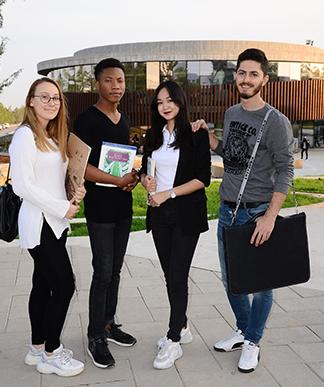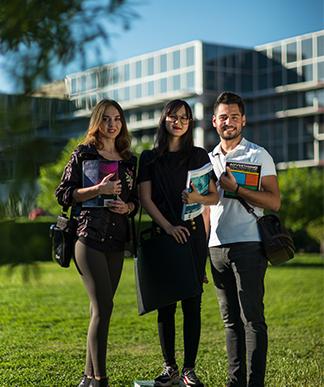


About the Program
The Ph.D. in ELT (English Language Teaching) aims to help Ph.D. candidates acquire theoretical and practical knowledge in contemporary research related to the fields of applied linguistics and language teaching, and to provide them with necessary skills to carry out quantitative, qualitative and mixed-methods research on language studies and language learning/teaching studies.
The Ph.D. program is open to students holding an M.A. degree in English Language Teaching or Applied Linguistics, but those who have a similar degree in related disciplines may also be admitted provided that they take a certain number of prerequisite courses following their admission. After the completion of 21 credit hours of coursework and the seminar, graduates are required to take a qualifying exam and submit a Ph.D. thesis followed by its oral defense. For the thesis defense, it is a requirement to publish an article related to the thesis topic in an SSCI journal. The successful completion of the program leads to the Doctor of Philosophy in ELT degree.
Education Opportunities
Those who hold an M.A. degree can apply for the Ph.D. study as well as students who hold a bachelor’s degree with a cumulative grade point average (CGPA) of at least 3.00, can apply for the Ph.D. in ELT program within the framework of Rules and Regulations related to the 5 Years Direct Entry Ph.D. Programs. Ph.D. candidates take seven elective courses and one compulsory seminar course. For each Ph.D. student, an ELT academic will be assigned as the thesis supervisor specializing in the related thesis topic and responsible for guiding the student through the thesis study.
Students of the Department of ELT have the opportunity to attend ELT seminars, conferences, and workshops frequently organized at the university.

Career Areas
The graduates of the Ph.D. in ELT program can work in the fields of curriculum development, teacher training, administration, and materials design as well as in the field of teaching English as a foreign or second language at private or state schools and especially at higher education institutions. Graduates of the Ph.D. in ELT program have the opportunity to work as an academic at a university and pursue an academic career by becoming an assistant professor, associate professor, and a full professor, respectively.
Contact
Institute of Graduate Studies and Research
Graduate Sciences and Education Center, GE106
Tel: +90 392 671 1111 Extension: 2776
Institute E-mail: ciu-institute@ciu.edu.tr
Compulsory Courses
First Semester
ELECTIVE I
Course code
ELTE6X1Credit
3Theoretical
3Practical
0Ects
8ELECTIVE II
Course code
ELTE6X2Credit
3Theoretical
3Practical
0Ects
8ELECTIVE III
Course code
ELTE6X3Credit
3Theoretical
3Practical
0Ects
8ELECTIVE IV
Course code
ELTE6X4Credit
3Theoretical
3Practical
0Ects
8Second Semester
THESIS
Course code
ELTE600Credit
0Theoretical
0Practical
0Ects
160PHD QUALIFICATION EXAM
Course code
ELTE650Credit
0Theoretical
0Practical
0Ects
20SEMINAR
Course code
ELTE690Credit
0Theoretical
0Practical
0Ects
4ELECTIVE V
Course code
ELTE6X5Credit
3Theoretical
3Practical
0Ects
8ELECTIVE VI
Course code
ELTE6X6Credit
3Theoretical
3Practical
0Ects
8Philosophy of Science
Course code
PHIL601Credit
3Theoretical
3Practical
0Ects
8Elective Courses
SEMANTIC AND PRAGMATIC ISSUES IN ELT
Course code
ELTE606Credit
3Theoretical
3Practical
0Ects
8ADVANCED RESEARCH TECHNIQUES IN ENGLISH LANGUAGE TEACHING
Course code
ELTE604Credit
3Theoretical
3Practical
0Ects
8PEDAGOGICAL STYLISTICS
Course code
ELTE610Credit
3Theoretical
3Practical
0Ects
8MANAGEMENT IN ELT
Course code
ELTE617Credit
3Theoretical
3Practical
0Ects
8ASPECTS OF BILINGUALISM/ MULTILINGUALISM
Course code
ELTE611Credit
3Theoretical
3Practical
0Ects
8CONTEMPORARY ISSUES IN ENGLISH LANGUAGE TEACHING
Course code
ELTE605Credit
3Theoretical
3Practical
0Ects
8THEORIES OF SECOND LANGUAGE ACQUISITION
Course code
ELTE612Credit
3Theoretical
3Practical
0Ects
8SPECIAL TOPICS
Course code
ELTE608Credit
3Theoretical
3Practical
0Ects
8THE PSYCHOLOGY OF FOREIGN LANGUAGE TEACHING
Course code
ELTE603Credit
3Theoretical
3Practical
0Ects
8TEXTUAL ANALYSIS
Course code
ELTE615Credit
3Theoretical
3Practical
0Ects
8TEFL METHODOLOGY
Course code
ELTE505Credit
0Theoretical
0Practical
0Ects
8SECOND LANGUAGE ACQUİSİTİON
Course code
ELTE502Credit
0Theoretical
0Practical
0Ects
8DISCOURSE ANALYSIS
Course code
ELTE509Credit
3Theoretical
3Practical
0Ects
8PRAGMATICS AND LANGUAGE TEACHING
Course code
ELTE524Credit
3Theoretical
3Practical
0Ects
8STATISTICAL COMPUTER APPLICATIONS FOR SOCIAL SCIENCES
Course code
STAT602Credit
3Theoretical
3Practical
0Ects
0SECOND LANGUAGE ACQUISITION
Course code
ELTE502Credit
3Theoretical
3Practical
0Ects
8ADVANCED STUDIES IN APPLIED LINGUISTICS
Course code
ELTE601Credit
3Theoretical
3Practical
0Ects
8LITERATURE IN TEFL
Course code
ELTE510Credit
3Theoretical
3Practical
0Ects
8CURRICULUM DESIGN AND EVALUATION
Course code
ELTE511Credit
3Theoretical
3Practical
0Ects
8SPECIAL STUDIES I
Course code
ELTE570Credit
3Theoretical
3Practical
0Ects
8DRAMA IN LANGUAGE CLASSES
Course code
ELTE613Credit
3Theoretical
3Practical
0Ects
8TEACHING ENGLISH TO YOUNG LEARNERS
Course code
ELTE516Credit
3Theoretical
3Practical
0Ects
8LITERATURE AND LANGUAGE INSTRUCTION
Course code
ELTE614Credit
3Theoretical
3Practical
0Ects
8APPLIED LİNGUISTICS FOR LANGUAGE TEACHERS
Course code
ELTE521Credit
3Theoretical
3Practical
0Ects
8LANGUAGE TESTING
Course code
ELTE506Credit
3Theoretical
3Practical
0Ects
8LITERATURE AND LANGUAGE
Course code
ELLE501Credit
3Theoretical
3Practical
0Ects
8SHORT STORY ANALYSIS
Course code
ELLE509Credit
3Theoretical
3Practical
0Ects
8LANGUAGE TESTING
Course code
ELTE506Credit
0Theoretical
0Practical
0Ects
8TEFL METHODOLOGY
Course code
ELTE505Credit
3Theoretical
3Practical
0Ects
8STYLISTICS
Course code
ELLE505Credit
3Theoretical
3Practical
0Ects
8Philosophy of Science
Course code
PHIL601Credit
3Theoretical
3Practical
0Ects
8CURRICULUM DESIGN AND EVALUATION
Course code
ELTE511Credit
0Theoretical
0Practical
0Ects
8TEACHING ENGLISH TO YOUNG LEARNERS
Course code
ELTE516Credit
0Theoretical
0Practical
0Ects
8Students who are interested in pursuing advanced graduate studies leading to a master’s, doctoral degree or professional doctorate degree for the Fall and Spring semesters every year. Applicants can directly apply online to our graduate programs using the application portal.
TRNC Applicants- Required documents:
- Bachelor’s and Master’s Degree Diploma
- Bachelor’s and Master’s Degree transcripts for each completed academic term/year.
- Documents to prove English proficiency for English language departments,
- Scanned copy of passport or identity card.
Click for detailed admission requirements information.
Students who are interested in pursuing advanced graduate studies leading to a master’s, doctoral degree, or professional doctorate degree for the Fall and Spring semesters every year. Applicants can directly apply online to our graduate programs using the application portal.
International Applicants- Required documents:
- A valid Bachelor’s Degree and transcripts for each completed academic term/year.
- A valid Master’s Degree and transcripts for each completed academic term/year.
- Evidence of English Language competence: TOEFL (65 IBT) or IELTS (5.5). Students without these documents will take the CIU English proficiency exam on campus following arrival.
- Scanned copy of international passport/birth certificate
- CV
- Ph.D. research proposal
- Fully completed and signed CIU Rules and Regulations document (which can be downloaded during the online application)
Click for detailed admission requirements information.
Cyprus International University provides academic scholarships for its students as an incentive for success, with most students benefiting from 50%, 75% or 100% scholarships or discounted tuition fees. Click for more information.
Tuition Fees are determined at the beginning of each academic year. Candidate students who are entitled to enroll in CIU can learn their fees in line with the Tuition Fee Calculation system.